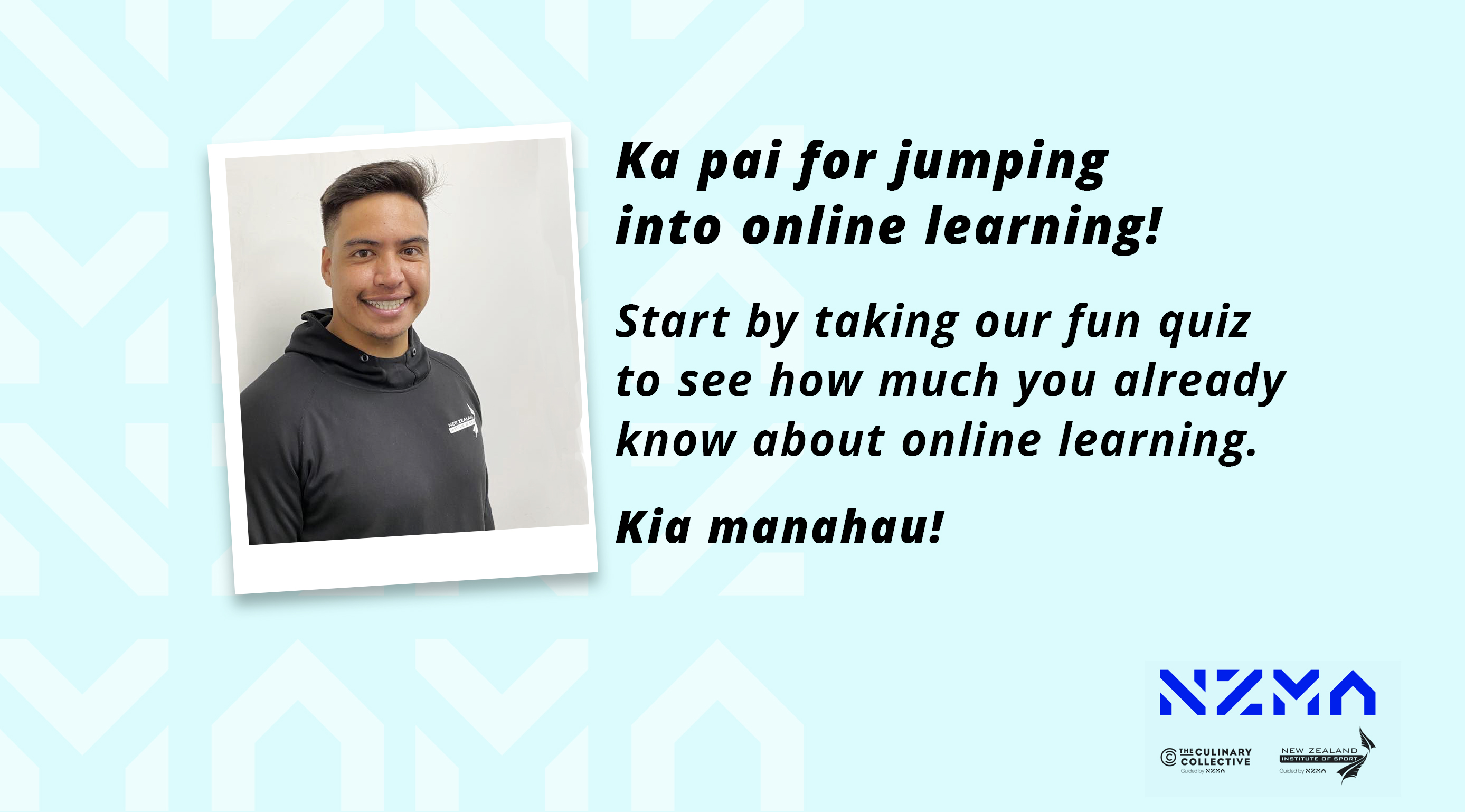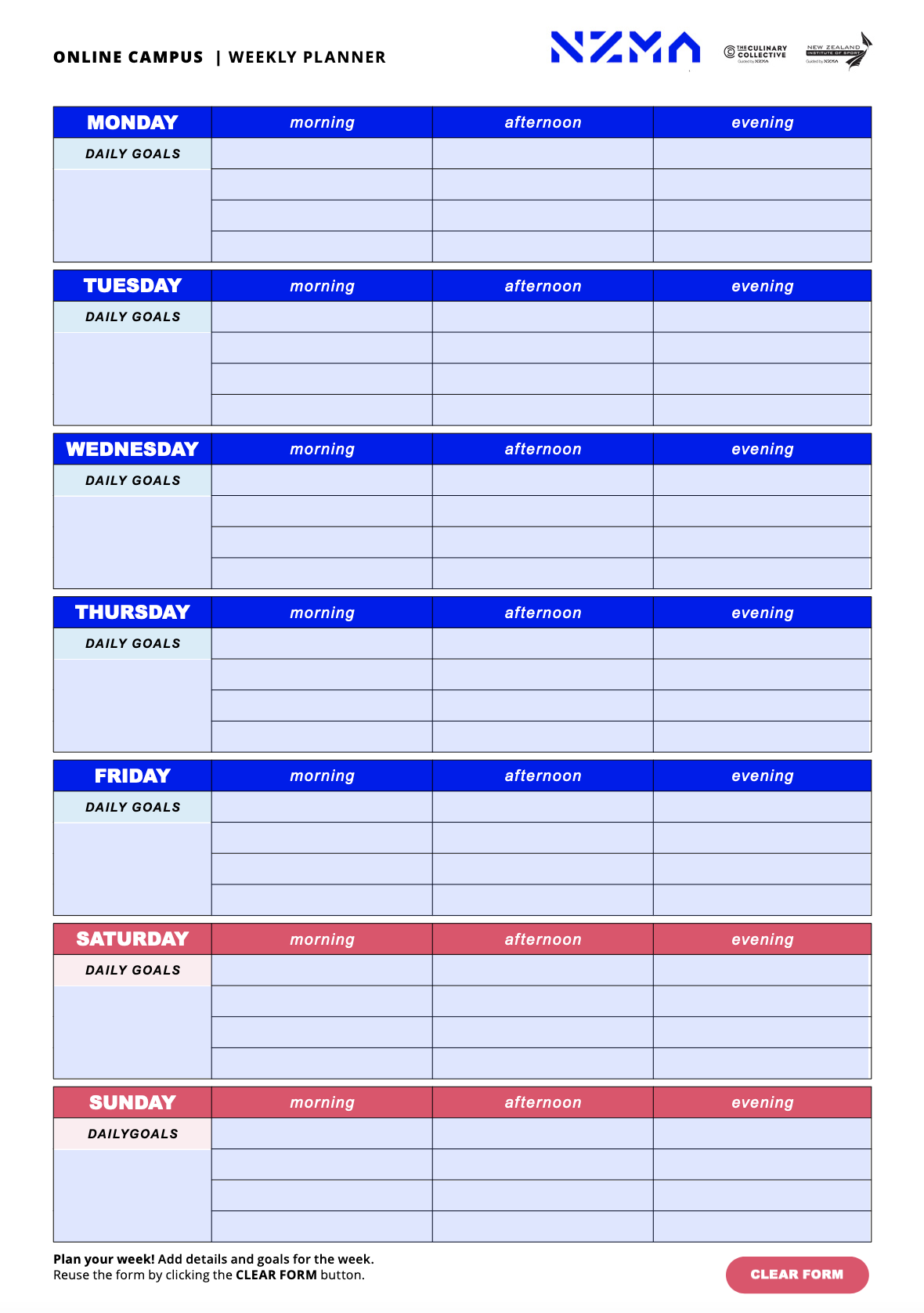“The better you manage your time, the easier it is to achieve your goals. Everyone has the same 24 hours in a day, meaning, it’s not about how much time you have, but how well you can manage it .” — Kelsey Miller, Northeastern University’s Graduate Programs Blog2

Having enough time to be a good student, worker, partner, and friend while still getting enough sleep requires planning your week effectively. Getting it right takes some commitment.
Make a plan to keep a schedule, limit distractions, and reward yourself. Remember, it may not feel fun to create the schedule, but it’s a lot worse to feel like you don’t have enough hours in the day to be the best you can be!
Start by taking our fun quiz to see how much you already know about online learning.
We’re not expecting you to ace that one yet. Start by reading about active learning, then work through the section. You will have an opportunity to retake the same quiz so you can see how much you’ve learned about online learning!
Getting involved means being an active learner.

Becoming an active online learner is all about participating in your Online Campus. There’s a reason people often say, “the more you put in — the more you get out.” If you don’t get involved, you will miss out on the fun, interesting, and engaging parts of your learning.
An active learner is:
- engaging in forums
- seeking feedback from your online tutor and fellow students
- booking one-on-one video sessions with your online tutor
- attending live sessions
- writing in your journal
- asking questions of the other students in the programme or tutor when you need more information
The difference between active and passive learning is that an active learner is switched on and looking for ways to connect with, extend, and apply the learning.
If you are unsure how best to do this, we've got you covered with some valuable tips and tricks in the material below.

Successfully juggling all the events and activities in your day is about planning and having the flexibility to go with the flow when things go wonky. To feel like a confident learner, you’ll want to balance your time commitments, including school, work, parenting/caregiving, and fun. Fun is no less fun just because it’s scheduled — and it’s important!
According to Kelsey Miller, whom we quoted above, use these seven tips for time management:2
Add all your time commitments into a calendar, including course open dates, planned study sessions, assignment and assessment deadlines, live sessions, and course milestones. Be sure you also add any work and personal commitments. Plan to log in daily to engage with your learning. But do plan in time off as well.
Studies have shown that it reduces productivity. Focus on one activity at a time and give it all of your attention. If you are studying, it’s a good idea to turn off notifications on your phone to reduce distractions. Create lists with priorities and timeframes to help keep yourself from getting too far ahead or behind in your programme.
You’ll drive yourself crazy if you are trying to study without broadband. Make sure you have the right tools and environment to be productive wherever you choose to study. In addition to internet connectivity, your environment should have enough light to work, minimal noise, be comfortable to concentrate on your learning and have privacy so you can focus without interruptions.
In addition to muting notifications on your phone or putting it away entirely, you need to remove other activities that may stop you from focussing. Try to steer clear of social media — it can be a true time-suck. Don’t go down rabbit holes that are not relevant to your work. There are software tools you can get to force you to stay focused, such as Freedom. There are multiple apps to help limit distractions; find one you like at Zapier's blog: The 8 best focus apps.
Rewarding yourself after a job well done is vital to avoid burnout. Otherwise, it won't be easy to concentrate on even the simplest tasks. Pick relatively healthy, doable rewards that feel a bit indulgent, such as stealing time for a Netflix show, grabbing a smoothie, catching a movie, or taking a longer-than-usual workout — think about what you consider a treat. However, if you consistently reward yourself with sugar-laden, processed snack food, you risk feeling like you aren’t looking after yourself at all, which is the opposite of how the reward is meant to make you feel!
If you are juggling your learning and work, striking a balance is crucial to avoid burnout. A balanced schedule means prioritising your time in a way that allows you to put 100% of your focus where it needs to be at that time.
Sleep is essential to rest your body and keep your mind fresh for the next day. Try to get seven to eight hours of rest a night. Pulling all-nighters is less productive than consistently working and can lead to illness. Include sleep in your schedule, and you can reap huge rewards.
Read the entire blogpost for additional detail.
The Pomodoro Technique3
The Pomodoro technique is geared to help students focus on learning.
Here is the basic idea:
Before phones, we used to set timers in our kitchens so we didn’t burn things. (Some of the timers looked like eggs or tomatoes, and pomodoro means tomato in Italian.)
This technique requires you to set a timer. You’ll have one on your phone.
- A Pomodoro equals a 25-minute session — set your timer, so you are not constantly checking the clock.
- A focussed learning session should be one pomodoro.
- Between Pomodoros, take a 5-minute break to do something else: take a walk, get a coffee...
- After four Pomodoros, take a 15-minute break.
- Set achievable goals (objectives) for yourself.
- Figure out how many Pomodoros you will need to get a section of learning done or achieve a goal.
Watch the video to learn more, then take the short quiz (in the video) to confirm your understanding before moving on.
Are you a certified Pomodoro Master yet?
Activity: Download the study planner

We’ve created an editable, weekly study planner just for you. Download it here and commit to using it or something similar daily.
